- Home
- Deborah Harkness
Shadow of Night Page 40
Shadow of Night Read online
Page 40
“Life and death are big responsibilities.” Matthew’s gray-green eyes were somber. “But I will love you regardless. You forget, I have power over life and death, too. What is it you told me that night I went hunting in Oxford? You said there was no difference between us. ‘Occasionally I eat partridge. Occasionally you feed on deer.’
“We are more similar, you and I, than either of us imagined,” Matthew continued. “But if you can believe good of me, knowing what you do of my past deeds, then you must allow me to believe the same of you.”
Suddenly I wanted to share my secrets. “There was a firedrake and a tree—”
“And the only thing that matters is that you are safely home,” he said, quieting me with a kiss.
Matthew held me so long and so tightly that for a few blissful moments I—almost—believed him.
The next day I went to Goody Alsop’s house to meet with Elizabeth Jackson and Catherine Streeter as promised. Annie accompanied me, but she was sent over to Susanna’s house to wait until my lesson was done.
The rowan branch was propped up in the corner. Otherwise the room looked perfectly ordinary and not at all like the kind of place where witches drew sacred circles or summoned firedrakes. Still, I expected some more visible signs that magic was about to be performed—a cauldron, perhaps, or colored candles to signify the elements.
Goody Alsop gestured to the table, where four chairs were arranged. “Come, Diana, and sit. We thought we might begin at the beginning. Tell us about your family. Much is revealed by following a witch’s bloodline.”
“But I thought you would teach me how to weave spells with fire and water.”
“What is blood, if not fire and water?” Elizabeth said.
Three hours later I was talked out and exhausted from dredging up memories of my childhood—the feeling of being watched, Peter Knox’s visit to the house, my parents’ death. But the three witches didn’t stop there. I relived every moment of high school and college, too: the daemons who followed me, the few spells I could perform without too much trouble, the strange occurrences that began only after I met Matthew. If there was a pattern to any of it, I failed to see it, but Goody Alsop sent me off with assurances that they would soon have a plan.
I dragged myself to Baynard’s Castle. Mary tucked me into a chair and refused my help, insisting I rest while she figured out what was wrong with our batch of prima materia. It had gone all black and sludgy, with a thin film of greenish goo on top.
My thoughts drifted while Mary worked. The day was sunny, and a beam of light sliced through the smoky air and fell on the mural depicting the alchemical dragon. I sat forward in my chair.
“No,” I said. “It can’t be.”
But it was. The dragon was not a dragon for it had only two legs. It was a firedrake and carried its barbed tail in its mouth, like the ouroboros on the de Clermont banner. The firedrake’s head was tilted to the sky, and it held a crescent moon in its jaws. A multipointed star rose above it. Matthew’s emblem. How had I not noticed before?
“What is it, Diana?” asked a frowning Mary.
“Would you do something for me, Mary, even if the request is strange?” I was already untying the silk cord at my wrists in anticipation of her answer.
“Of course. What is it you need?”
The firedrake dripped squiggly blobs of blood into the alchemical vessel below its wings. There the blood swam in a sea of mercury and silver.
“I want you to take my blood and put it in a solution of aqua fortis, silver, and mercury,” I said. Mary’s glance moved from me to the firedrake and back. “For what is blood but fire and water, a conjunction of opposites, and a chemical wedding?”
“Very well, Diana,” Mary agreed, sounding mystified. But she asked no more questions.
I flicked my finger confidently over the scar on my inner arm. I had no need for a knife this time. The skin parted, as I knew it would, and the blood welled up simply because I had need of it. Joan rushed forward with a small bowl to catch the red liquid. On the wall above, the silver and black eyes of the firedrake followed the drops as they fell.
“‘It begins with absence and desire, it begins with blood and fear,’” I whispered.
“‘It began with a discovery of witches,’” time responded, in a primeval echo that set alight the blue and amber threads that flickered against the room’s stone walls.
Chapter Twenty Four
"Is it going to keep doing that?” I stood, frowning, hands on my hips, and stared up at Susanna’s ceiling.
“‘She,’ Diana. Your firedrake is female,” Catherine said. She was also
looking at the ceiling, her expression bemused.
“She. It. That.” I pointed up. I had been trying to weave a spell when my dragon escaped confinement within my rib cage. Again. She was now plastered to the ceiling, breathing out gusts of smoke and chattering her > teeth in agitation. “I can’t have it—her—flying around the room whenever she feels the urge.” The repercussions would be serious should she become loose at Yale among the students.
“That your firedrake broke free is merely a symptom of a much more serious problem.” Goody Alsop extended a bunch of brightly colored silken strands, knotted together at the top. The ends flowed free like the ribbons on a maypole and numbered nine in all, in shades of red, white, black, silver, gold, green, brown, blue, and yellow. “You are a weaver and must learn to control your power.”
“I am well aware of that, Goody Alsop, but I still don’t see how this— embroidery floss—will help,” I said stubbornly. The dragon squawked in agreement, waxing more substantial with the sound and then waning into her typical smoky outlines.
“And what do you know about being a weaver?” Goody Alsop asked sharply.
“Not much,” I confessed.
“Diana should sip this first.” Susanna approached me with a steaming cup. The scents of chamomile and mint filled the air. My dragon cocked her head in interest. “It is a calming draft and may soothe her beast.”
“I am not so concerned with the firedrake,” Catherine said dismissively.
“Getting one to obey is always difficult—like trying to curb a daemon who is intent on making mischief.” It was, I thought, easy for her to say. She didn’t have to persuade the beast to climb back inside her.
“What plants went into the tisane?” I asked, taking a sip of Susanna’s brew. After Marthe’s tea I was a bit suspicious of herbal concoctions. No sooner was the question out of my mouth than the cup began to bloom with sprigs of mint, the straw-scented flowers of chamomile, foamy Angelica, and some stiff, glossy leaves that I couldn’t identify. I swore.
“You see!” Catherine said, pointing to the cup. “It’s as I said. When Diana asks a question, the goddess answers it.”
Susanna looked at her beaker with alarm as it cracked under the pressure of the swelling roots. “I think you are right, Catherine. But if she is to weave rather than break things, she will need to ask better questions.” Goody Alsop and Catherine had figured out the secret to my power: It was inconveniently tied to my curiosity. Now certain events made better sense: my white table and its brightly colored puzzle pieces that came to my rescue whenever I faced a problem, the butter flying out of Sarah’s refrigerator in Madison when I wondered if there was more. Even the strange appearance of Ashmole 782 at the Bodleian Library could be explained:
When I filled out the call slip, I’d wondered what might be in the volume.
Earlier today my simple musings about who might have written one of the spells in Susanna’s grimoire had caused the ink to unspool from the page and re-form on the table next to it in an exact likeness of her dead grandmother.
I promised Susanna to put the words back as soon as I figured out how. And so I discovered that the practice of magic was not unlike the practice of history. The trick to both wasn’t finding the correct answers but formulating better questions.
“Tell us again about calling witchwater, Diana, and the b
ow and arrow that appear when someone you love is in trouble,” Susanna suggested. “Perhaps that will provide some method we can follow.”
I rehearsed the events of the night Matthew had left me at Sept-Tours when the water had come out of me in a flood and the morning in Sarah’s orchard when I’d seen the veins of water underground. And I carefully accounted for every time the bow had appeared—even when there was no arrow or when there was but I didn’t shoot it. When I finished, Catherine drew a satisfied sigh.
“I see the problem now. Diana is not fully present unless she is protecting someone or when forced to face her fears,” Catherine observed. “She is always puzzling over the past or wondering about the future. A witch must be entirely in the here and now to work magic.”
My firedrake flapped her wings in agreement, sending warm gusts of air around the room.
“Matthew always thought there was a connection between my emotions, my needs, and my magic,” I told them.
“Sometimes I wonder if that wearh is not part witch,” Catherine said.
The others laughed at the ridiculous notion of Ysabeau de Clermont’s son having even a drop of witch’s blood.
“I think it’s safe to leave the firedrake to her own devices for the time being and return to the matter of Diana’s disguising spell,” Goody Alsop said, referring to my need to shield the surfeit of energy that was released whenever I used magic. “Are you making any progress?”
“I felt wisps of smoke form around me,” I said hesitantly.
“You need to focus on your knots,” Goody Alsop said, looking pointedly at the cords in my lap. Each shade could be found in the threads that bound the worlds, and manipulating the cords—twisting and tying them—worked a sympathetic magic. But first I needed to know which strands to use. I took hold of the colorful cords by the topknot. Goody Alsop had taught me how to blow gently on the strands while focusing my intentions. That was supposed to loosen the appropriate cords for whatever spell I was trying to weave.
I blew into the strands so that they shimmered and danced. The yellow and brown cords worked themselves loose and dropped into my lap, along with the red, blue, silver, and white. I ran my fingers down the nine-inch lengths of twisted silk. Six strands meant six different knots, each one more complex than the last.
My knot-making skills were still clumsy, but I found this part of weaving oddly soothing. When I practiced the elaborate twistings and crossings with ordinary string, the result was something reminiscent of ancient Celtic knotwork. There was a hierarchical order to the knots. The first two were single and double slipknots. Sarah used them sometimes, when she was making a love spell or some other binding. But only weavers could make the intricate knots that involved as many as nine distinct crossings and ended with the two free ends of the cord magically fused to make an unbreakable weaving.
I took a deep breath and refocused my intentions. A disguise was a form of protection, and purple was its color. But there was no purple cord. Without delay the blue and red cords rose up and spun together so tightly that the final result looked exactly like the mottled purple candles that my mother used to set in the windows on the nights when the moon was dark.
“With knot of one, the spell’s begun,” I murmured, looping the purple cord into the simple slipknot. The firedrake crooned an imitation of my words.
I looked up at her and was struck once again by the firedrake’s changeable appearance. When she breathed out, she faded into a blurred smudge of smoke. When she breathed in, her outlines sharpened. She was a perfect balance of substance and spirit, neither one nor the other. Would I ever feel that coherent?
“With knot of two, the spell be true.” I made a double knot along the same purple cord. Wondering if there was a way I could fade into gray obscurity whenever I wished, the way the firedrake did, I ran the yellow cord through my fingers. The third knot was the first true weaver’s knot I had to make. Though it involved only three crossings, it was still a challenge.
“With knot of three, the spell is free.” I looped and twisted the cord into a trefoil shape, then drew the ends together. They fused to form the weaver’s unbreakable knot.
Sighing with relief, I dropped it into my lap, and from my mouth came a gray mist finer than smoke. It hung around me like a shroud. I gasped in surprise, letting out more of the eerie, transparent fog. I looked up. Where had the firedrake gone? The brown cord leaped into my fingers. “With knot of four, the power is stored.” I loved the pretzel-like shape of the fourth knot, with its sinuous bends and twists.
“Very good, Diana,” Goody Alsop said. This was the moment in my spells when everything tended to go wrong. “Now, remain in the moment and bid the dragon to stay with you. If she is so inclined, she will hide you from curious eyes.”
The firedrake’s cooperation seemed too much to hope for, but I made the pentacle-shaped knot anyway, using the white cord. “With knot of five, the spell will thrive.”
The firedrake swooped down and nestled her wings against my ribs. “Will you stay with me?” I silently asked her.
The firedrake wrapped me in a fine gray cocoon. It dulled the black of my skirts and jacket, turning them a deep charcoal. Ysabeau’s ring glittered less brightly, the fire at the heart of the diamond dimmed. Even the silver cord in my lap looked tarnished. I smiled at the firedrake’s silent answer. “With knot of six, this spell I fix,” I said. My final knot was not as symmetrical as it should have been, but it held nonetheless.
“You are indeed a weaver, child,” Goody Alsop said, letting out her breath.
I felt marvelously inconspicuous on my walk home, wrapped in my firedrake muffler, but came to life again when my feet crossed over the threshold of the Hart and Crown. A package waited for me there, along with Kit. Matthew was still spending too much time with the mercurial daemon. Marlowe and I exchanged cool greetings, and I had started unpicking the package’s protective wrappings when Matthew let out a mighty roar.
“Good Christ!” Where moments before there was empty space, there was now Matthew, staring at a piece of paper in disbelief.
“What does the Old Fox want now?” Kit asked sourly, jamming his pen into a pot of ink.
“I just received a bill from Nicholas Vallin, the goldsmith up the lane,” Matthew said, scowling. I looked at him innocently. “He charged me fifteen pounds for a mousetrap.” Now that I better understood the purchasing power of a pound—and that Mary’s servant Joan earned only five pounds a year—I could see why Matthew was shocked.
“Oh. That.” I returned my attention to the package. “I asked him to make it.”
“You had one of the finest goldsmiths in London make you a mousetrap?” Kit was incredulous. “If you have any more funds to spare, Mistress Roydon, I hope you will allow me to undertake an alchemical experiment for you. I will transmute your silver and gold into wine at the Cardinal’s Hat!”
“It’s a rat trap, not a mousetrap,” I muttered.
“Might I see this rat trap?” Matthew’s tone was ominously even.
I removed the last of the wrappings and held out the article in question.
“Silver gilt. And engraved, too,” Matthew said, turning it over in his hand. After looking more closely at it, he swore. “‘Ars longa, vita brevis.’ Art is long, but life is short. Indeed.”
“It’s supposed to be very effective.” Monsieur Vallin’s cunning design resembled a watchful feline, with a pair of finely worked ears on the hinge, a wide set of eyes carved into the cross brace. The edges of the trap resembled a mouth, complete with lethal teeth. It reminded me a bit of Sarah’s cat, Tabitha. Vallin had provided an added bit of whimsy by perching a silver mouse on the cat’s nose. The tiny creature bore no resemblance to the long-toothed monsters that prowled around our attics. The mere thought of them munching their way through Matthew’s papers while we slept made me shudder.
“Look. He’s engraved the bottom of it, too,” Kit said, following the romping mice around the base of the trap. “It bea
rs the rest of Hippocrates’ aphorism—and in Latin, no less. ‘Occasio præceps, experimentum periculosum, iudicium difficile.’”
“It may be an excessively sentimental inscription, given the instrument’s purpose,” I admitted.
“Sentimental?” Matthew’s eyebrow shot up. “From the viewpoint of the rat, it sounds quite realistic: Opportunity is fleeting, experiment dangerous, and judgment difficult.” His mouth twitched.
“Vallin took advantage of you, Mistress Roydon,” Kit pronounced. “You should refuse payment, Matt, and send the trap back.”
“No!” I protested. “It’s not his fault. We were talking about clocks, and Monsieur Vallin showed me some beautiful examples. I shared my pamphlet from John Chandler’s shop in Cripplegate—the one with the instructions on how to catch vermin—and told Monsieur Vallin about our rat problem. One thing led to another.” I looked down at the trap. It really was an extraordinary piece of craftsmanship, with its tiny gears and springs.
“All of London has a rat problem,” Matthew said, struggling for control. “Yet I know of no one who requires a silver-gilt toy to resolve it. A few affordable cats normally suffice.”
“I’ll pay him, Matthew.” Doing so would probably empty out my purse, and I would be forced to ask Walter for more funds, but it couldn’t be helped. Experience was always valuable. Sometimes it was costly, too. I held out my hand for the trap.
“Did Vallin design it to strike the hours? If so, and it is the world’s only combined timepiece and pest-control device, perhaps the price is fair after all.” Matthew was trying to frown, but his face broke into a grin. Instead of giving me the trap, he took my hand, brought it to his mouth, and kissed it. “I’ll pay the bill, mon coeur, if only to have the right to tease you about it for the next sixty years.”
At that moment George hurried into the front hall. A blast of cold air entered with him.
“I have news!” He flung his cloak aside and struck a proud pose.
Kit groaned and put his head in his hands. “Don’t tell me. That idiot Ponsonby is pleased with your translation of Homer and wants to publish it without further corrections.”
“Not even you will dim my pleasure in today’s achievements, Kit.” George looked around expectantly. “Well? Are none of you the least bit curious?”
“What is your news, George?” Matthew said absently, tossing the trap into the air and catching it again.
“I found Mistress Roydon’s manuscript.”
Matthew’s grip on the rat trap tightened. The mechanism sprang open. When he released his fingers, it fell to the table with a clatter as it

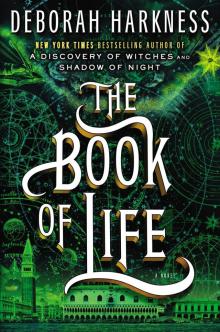 The Book of Life
The Book of Life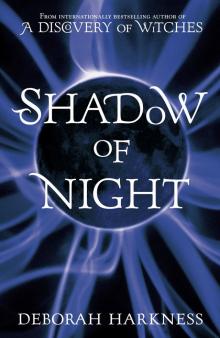 Shadow of Night
Shadow of Night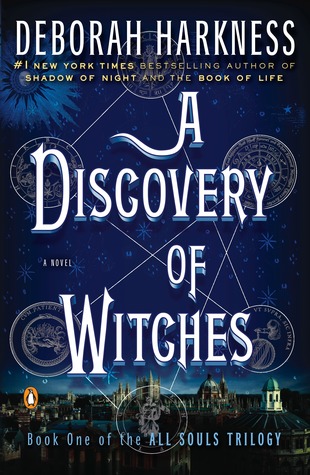 A Discovery of Witches
A Discovery of Witches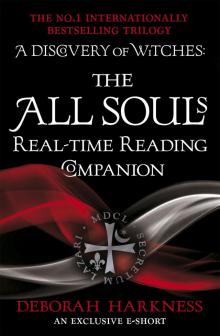 The All Souls Real-Time Reading Companion
The All Souls Real-Time Reading Companion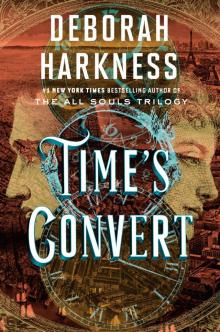 Time's Convert
Time's Convert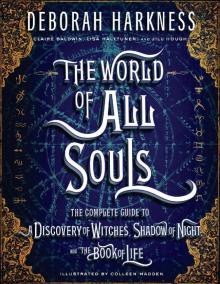 The World of All Souls
The World of All Souls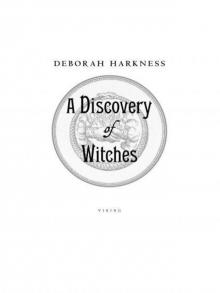 A Discovery of Witches: A Novel (All Souls Trilogy)
A Discovery of Witches: A Novel (All Souls Trilogy)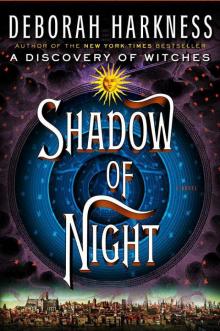 Shadow of Night: A Novel
Shadow of Night: A Novel